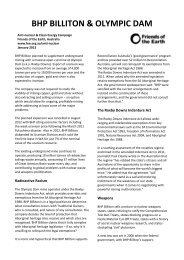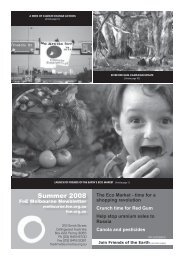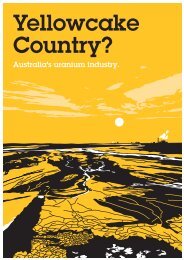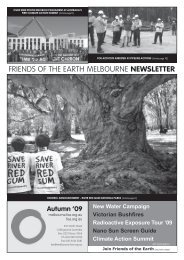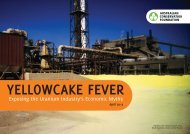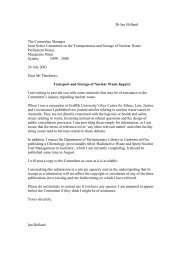Thirty Years of Creative Resistance - Friends of the Earth Australia
Thirty Years of Creative Resistance - Friends of the Earth Australia
Thirty Years of Creative Resistance - Friends of the Earth Australia
Create successful ePaper yourself
Turn your PDF publications into a flip-book with our unique Google optimized e-Paper software.
with its work on waste minimisation,<br />
uranium, hazardous chemicals and high<br />
temperature incinerators. O<strong>the</strong>r groups<br />
that did similar work, particularly <strong>the</strong> ACF<br />
and Greenpeace, were large enough<br />
and balanced enough by <strong>the</strong>ir ‘traditional’<br />
green campaigns that <strong>the</strong>y were able to<br />
continue to build pr<strong>of</strong>ile and influence while<br />
FoE’s national presence waned.<br />
They also had larger infrastructure, more<br />
aggressive membership programs and<br />
separate fundraising departments. FoE, in<br />
contrast, neglected to establish this type <strong>of</strong><br />
infrastructure and prioritised decentralised<br />
action over consolidation <strong>of</strong> functions. It<br />
is interesting to imagine what may have<br />
happened if FoE had ‘pr<strong>of</strong>essionalised’<br />
its fundraising, lobbying, and membership<br />
development functions – as was<br />
happening elsewhere in <strong>the</strong> movement<br />
at this time – while maintaining its radical<br />
structures and politics.<br />
In spite <strong>of</strong> decreased national pr<strong>of</strong>ile and<br />
influence, FoE’s campaign work continued<br />
to yield results. As one example, <strong>the</strong> efforts<br />
<strong>of</strong> David Vincent and o<strong>the</strong>rs on recycling<br />
were significant. FoE was an early and<br />
consistent voice calling for <strong>the</strong> setting <strong>of</strong><br />
national targets for a recycled materials<br />
purchasing policy.<br />
As forest blockades at Nightcap, <strong>the</strong><br />
Franklin, Daintree, Errinundra in eastern<br />
Victoria, and elsewhere captured <strong>the</strong><br />
public’s attention in <strong>the</strong> early and mid<br />
1980s, some in FoE expressed concern<br />
at what <strong>the</strong>y saw as a backwards step<br />
in <strong>the</strong> development <strong>of</strong> <strong>the</strong> environment<br />
movement in <strong>Australia</strong>. This related to a<br />
growing tension that saw middle class<br />
‘greenies’ setting <strong>the</strong>mselves against<br />
working class people from <strong>the</strong> timber<br />
industry.<br />
In many ways, <strong>the</strong> conflict over forestry<br />
operations became <strong>the</strong> benchmark <strong>of</strong><br />
what <strong>the</strong> broader community perceived<br />
as ‘environmentalism’ in <strong>the</strong> 1980s and<br />
much <strong>of</strong> <strong>the</strong> ‘90s. Some in FoE felt that<br />
direct action in <strong>the</strong> forests was ‘anti<br />
worker’, ‘elitist’ and ‘highlighted <strong>the</strong><br />
wider environment movement’s lack <strong>of</strong><br />
...................................................................................................................................................................................................<br />
strategy for social change, isolation<br />
from o<strong>the</strong>r social movements, and lack<br />
<strong>of</strong> understanding about <strong>the</strong> processes<br />
which bring about environmental<br />
destruction’. Faced with an increasingly<br />
disinterested and unresponsive Federal<br />
Government, many activists decided to<br />
focus <strong>the</strong> bulk <strong>of</strong> <strong>the</strong>ir attention on those<br />
implementing forest policies, ra<strong>the</strong>r than<br />
on those who were setting <strong>the</strong>m.<br />
Earlier class-conscious, socially<br />
engaged environmental activism, as<br />
epitomised by <strong>the</strong> Green Bans and<br />
Environmentalists for Full Employment,<br />
was increasingly being eclipsed by an<br />
apolitical analysis and middle class<br />
environmentalism. FoE grappled with<br />
<strong>the</strong>se changes and sought to continue<br />
broad-based alliances outside <strong>the</strong><br />
increasingly narrowly defined green<br />
movement.<br />
Uranium mining operations at Ranger<br />
continued with FoE, <strong>the</strong> ACF and o<strong>the</strong>r<br />
groups keeping a watchful eye on<br />
FoE 30 <strong>Years</strong> 40



